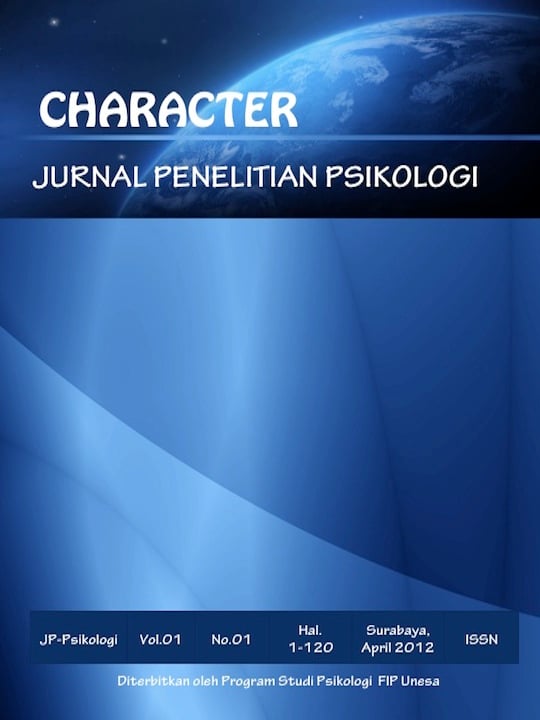HUBUNGAN ANTARA HARDINESS DENGAN STRES AKADEMIK PADA MAHASISWA YANG MENGERJAKAN SKRIPSI SELAMA PANDEMI COVID 19
DOI:
https://doi.org/10.26740/cjpp.v8i1.39116Abstract
AbstrakTujuan penelitian ini yaitu untuk mengetahui hubungan antara hardiness dengan stres akademik pada mahasiswa yang sedang mengerjakan skripsi selama pandemi covid 19. Metode yang digunakan dalam penelitian yaitu kuantitatif korelasional. Populasi dalam penelitian berjumlah 231 dengan memiliki kriteria mahasiswa Psikologi Universitas Negeri Surabaya angkatan 2016 2017 yang sedang mengerjakan skripsi. Pengambilan sampel dilakukan dengan teknik stratified random sampling. Subjek berjumlah 80 mahasiswa dengan rincian angkatan 2016 berjumlah 16 mahasiswa dan angkatan 2017 berjumlah 64, serta 66 berjenis kelamin perempuan dan 14 berjenis kelamin laki-laki. Intrumen yang digunakan yaitu skala hardiness yang disusun berdasarkan pada teori Kobasa dan skala stres akademik yang diadaptasi dari teori Gadzella. Teknik analisis data dilakukan dengan product moment pearson. Hasil penelitian menunjukkan bahwa terdapat hubungan yang negatif antara hardiness dengan stres akademik pada mahasiswa yang mengerjakan skripsi selama pandemi covid 19 dengan nilai signifikasi 0,000 dan nilai korelasi -0,617. Hasil tersebut menunjukkan bahwa semakin tinggi hardiness, maka semakin rendah stres akademik dan sebaliknya semakin rendah hardiness maka semakin tinggi stres akademik yang dialami mahasiswa. Hal ini disebabkan karena dengan adanya kepribadian hardiness maka mahasiswa dapat mengontrol, mengubah situasi yang menegangkan, memiliki komitmen untuk emnyelesaikan skripsi dengan baik serta menilai bahwa perubahan merupakan suatu tantangan sehingga stres akademik yang dialami mahasiswa menjadi berkurang. Hardiness memberikan sumbangan 38,1% terhadap stres akademik dan 61,9 stres akademik dipengaruhi oleh faktor yang lain.
Kata kunci: hardiness, stres akademik, mahasiswa, skripsi, pandemi covid 19.
Abstract
This research aimed to test empirically the relationship between hardiness and academic stress to college student with their thesis during pandemic covid 19. The method is kuantitatif correlational. The populations in study amounted to 231 with criteria is 2016 and 2017 Psychology college University of Surabaya who work on their thesis. Participant in the study of 80 psychology college University State of Surabaya with details is 16 partisipants for 2016, 64 partisipants for 2017 and 66 female, 14 male. The instrument used in this research is hardiness scale from Kobasa theory and academic stress scale from Gadzella theory. The data analysis technique used to prodect moment pearson. The result showed a significant negative correlation between hardiness and academic stress to college student with their thesis during pandemic covid 19 with significant value 0,000 and correlation value -0,617. The result show the higher hardiness, that lower academic stress and vice versa. This is because students with hardiness personality can control and change the situasions, have commitment to complete their thesis and assess that change is challenge, so academic stress experienced can reduced. Hardiness gives contributions 38,1% to academic stress and 61,9% academic stress is influenced by other factors.
Keywords: hardiness, academic stress, college student, thesis, pandemic covid 19
Downloads
Downloads
Published
How to Cite
Issue
Section
License
Authors who publish in this journal agree to the following terms:
Copyright in any article is held by the author.
The author grants the journal, publication rights with the work simultaneously licensed under a Creative Commons Attribution License that allows others to share the work with an acknowledgment of the work's authorship and initial publication in this journal.
Authors may enter into separate, additional contractual arrangements for the non-exclusive distribution of the journal's published version of the work (e.g., posting it to an institutional repository or publishing it in a book), with an acknowledgment of its initial publication in this journal.
Authors are permitted and encouraged to post their work online (e.g., in an institutional repository or on their website) prior to and during the submission process, as this can lead to productive exchanges, as well as earlier and greater citation of published work.
 Abstract views: 6950
,
Abstract views: 6950
, PDF Downloads: 6533
PDF Downloads: 6533





